
The Treaty of Nanking (Nanjing) was a peace treaty which ended the First Opium War (1839–1842) between Great Britain and China on 29 August 1842. It was the first of what the Chinese later called the unequal treaties.
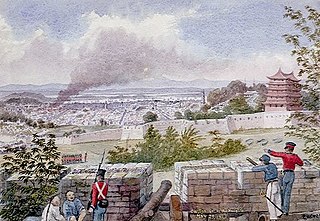
The Opium Wars were two wars which were waged between the Qing dynasty and Western powers in the mid-19th century. The First Opium War, fought in 1839-1842 between the Qing and Great Britain, was triggered by the dynasty's campaign against the opium trade; the Second Opium War was fought between the Qing and Britain and France, 1856-1860. In each war, the European forces used recently developed warfare technology to defeat the Qing forces and compelled the government to grant favorable tariffs, trade concessions, and territory.
The Chartered Bank of India, Australia and China was a bank incorporated in London in 1853 by Scotsman James Wilson, under a Royal Charter from Queen Victoria.

The Canton System (1757–1842) served as a means for China to control trade with the West within its own country by focusing all trade on the southern port of Canton. Known in Chinese as the Yīkǒu tōngshāng the policy arose in 1757 as a response to a perceived political and commercial threat from abroad on the part of successive Chinese emperors.
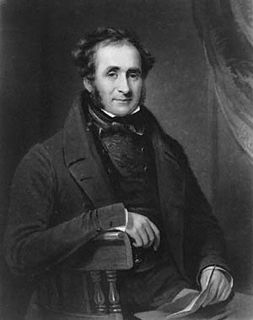
Sir James Nicolas Sutherland Matheson, 1st Baronet, FRS, was a Scottish Tai-Pan. Born in Shiness, Lairg, Sutherland, Scotland, he was the son of Captain Donald Matheson. He attended Edinburgh's Royal High School and the University of Edinburgh. He and William Jardine went on to co-found the Hong Kong-based trading conglomerate Jardine Matheson & Co. that became today's Jardine Matheson Holdings.
Inchcape plc is a multinational automotive distribution, retail and services company headquartered in London, United Kingdom. An outgrowth of Calcutta-based Mackinnon Mackenzie Company, Inchcape has operations in 32 countries across Asia, Australia, Europe, Africa and South America.

Dent & Co. or Dent's, was one of the wealthiest British merchant firms, or Hongs, active in China during the 19th century. A direct rival to Jardine, Matheson & Co, together with Russell & Co., these three companies are recognised as the original Canton Hongs active in early Colonial Hong Kong.
Sir Fazalbhoy Currimbhoy Ebrahim, 1st Baronet was a mid 19th century Gujarati Khoja businessman of the Nizari Ismaili faith based in Bombay. He is credited with founding E. Pabaney & Co, a family held trading and ship owning company whose trading interests extended as far as the Arabian peninsula, the African coast and China.
A Hong originally designates both a type of building and a type of Chinese merchant intermediary in Guangzhou, Guangdong, China, in the 18-19th century, specifically during the Canton System period.

Sir Sassoon Jacob Hai David, 1st Baronet was a member of the community of Baghdadi Jews who lived in Bombay from the late 18th Century into the 20th Century. He was a textile mill-owner and merchant who also became Chairman of the Bank of India.

The Oriental Bank Corporation, or "OBC", was a British imperial bank founded in India in 1842 which grew to be prominent throughout the Far East. As an Exchange bank, the OBC was primarily concerned with the finance of trade and exchanges of different currencies. It was the first bank in Hong Kong and the first bank to issue banknotes in Hong Kong.

Russell & Company was the largest American trading house of the mid-19th century in China.
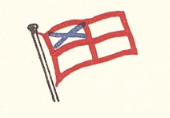
Dodwell & Co. or Dodwell's, was one of the leading British merchant firms, or hongs, active in China and Japan during the 19th and 20th century. It was a direct rival to Jardine, Matheson & Co.

Jardine Matheson & Co., later Jardine Matheson & Co. Ltd., forerunner of today's Jardine Matheson Holdings, was a Far Eastern company founded in 1832 by Scotsmen William Jardine and James Matheson as senior partners. Trafficking opium in Asia, while also trading cotton, tea, silk and a variety of other goods, from its early beginnings in Canton, in 1844 the firm established its head office in the new British colony of Hong Kong then proceeded to expand all along the China Coast.

Jardine Matheson Holdings Limited is a multinational conglomerate incorporated in Bermuda and headquartered in Hong Kong, with its primary listing on the London Stock Exchange and secondary listings on the Singapore Exchange and Bermuda Stock Exchange. The majority of its business interests are in Asia, and its subsidiaries include Jardine Pacific, Jardine Motors, Jardine Lloyd Thompson, Hongkong Land, Jardine Strategic Holdings, Dairy Farm, Mandarin Oriental Hotel Group, Jardine Cycle & Carriage and Astra International. It sponsors the Jardine Scholarship.

Archibald Orr Lang was a Scottish shipping businessman and unofficial member of the Executive Council and Legislative Council of Hong Kong.
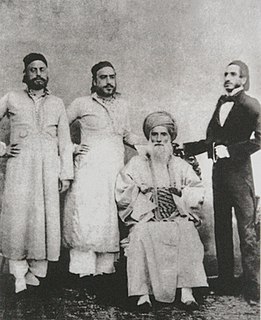
David Sassoon & Co., Ltd. was a trading company operating in the 19th century and early 20th century predominantly in India, China and Japan.
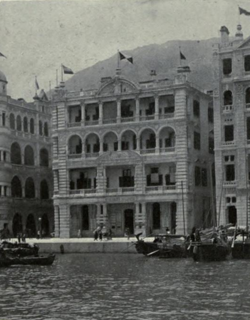
Shewan, Tomes & Co. was one of the leading trading companies in Hong Kong and China during the late 19th and early 20th century.
Olyphant & Co. was a merchant trading house or hong in 19th-century China. From its initial involvement in the "Old China Trade", the firm expanded into other countries including Great Britain, Australia and New Zealand. Olyphant & Co's business dealings in Peru caused the company to collapse in 1878.
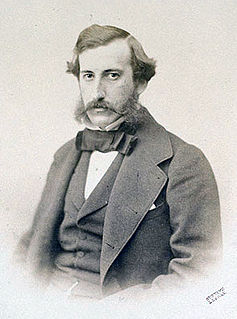
Albert Farley Heard was an American merchant, diplomat and author. He was the son of Elizabeth Ann Farley and George Washington Heard, brother of Augustine Heard. After graduating from Yale University, he went to China to assist his uncle Augustine with the management of his trading firm, Augustine Heard & Co. He later became the head of the company, and was the second-ranked member on the founding committee of The Hongkong and Shanghai Banking Corporation.
















